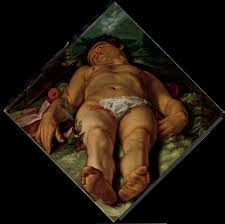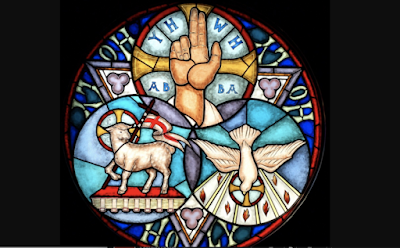COMMUNION ANTIPHON Mt 26: 42
Pater, si non potest hic calix transire, nisi bibam illum, fiat voluntas tua.
Father, if this chalice cannot pass without my drinking it,
your will be done.'
There is much to do, and yet, if I was called to have sex, I would get up and have it. Last night, for my consecration I wrapped me thighs around the naked body of a man I've been longing to have sex with for years. His mouth tasted me lazily and he thumbed my nipples as he sucked me slowly. In the three am darkness I fucked his mouth and the bed creaked. Later I spilled my seed with a grunt. Sex does not make you feel more loved. I already feel loved. It does not make you feel more wanted. You can feel wanted by showing your sexy pics online, by dressing up in pretty clothes. Sex makes you feel pourous, liquid, touched. You are fragile and real again, weak in strength and strong in your vulnerability. It is the perfect consecration to Babalon, and long after it is over you feel the force which is no private force and also no communal force running through you. The descent of the Holy Spirit happens in company. Sexual pleasure happens between two people. To put on the red robes is to state frankly that you have touched and been touched.

This is Palm Week. Holy Week. This is the week of many readings, many services, much preparation, the week when much could go wrong, the week that must find its meaning in the silences between spaces.Friday was the Feast of the Annunciation, the rememberance of the Jesus's Conception. The ancient mind believed people died and were born or conceived on the same date, and so Annunciation happens here, in Lent, often as not near the end of it and sometimes it has been on Good Friday itself. Last night after the drama of the passion, I had sex and was consecrated to Babalon. These two passions are one.
In this week there is so much to do spiritually, so much to do in acts of cookery as well as responsibility, that over and over I must remember I am not the high priest of this show. I am not the chief orchestrator of this Great Work, nor am I the Great Work. I am not now, nor have I ever been, the ultimate Master.
There are other things scheduled to happen, to be meditated over, but it is sex that seems to keep happening and presenting itself, and sex that must be served.
When my mother was alive she used to say she didn't feel like Christmas, or lament every season coming because it didn't feel like it should, which i suppose is a lot like saying didn't feel like it once did. But you must accept things as they are, not as they are supposed to be, and fall into the rhythm of what is not what you wished was.. This is the secret of magic.

There are times when I forget that I am a witch, and that what we are doing here is magic, or do not say it or think what goes on this page is so broad that ti can be printed or shone anywhere, but the act of sacred prostituion, the initatiory rites of Babalon bring back home exactly what I am and what this page is. This page is the liturgy of celebrating union with the lovers who come to me, of remembering the pink candles and strong mouth of Scott and th entangling of bodies, the ejection of seed. This raw sex is the opposite of the sexiness of the society we live in, or the repression of our churches and the heart of what I do, and I practice it in this Holy Week.

And somehow, this story of the red priestess, the offered and experienced sexuality is linked with the passion of the lord who will be crucified before the week is out. One Passion goes to another. The lady in red is the Mary anointing the lord, the descent into sexual pleasure and Inanna's trip to the underworld, frightful as it is, mirrors Christ leaving the city gates to make his own underworld trip. Sex and sensuality are taken from one story completely, but maybe no it must be brought back.
ENTRANCE ANTIPHON Cf. Ps 27 (26): 12
Ne tradideris me, Domine, in animas presequentium me; quoniam insurrexerunt in me testes iniqui, et mentita est iniquitas sibi.
Do not leave me to the will of my foes, O Lord,
for false witnesses rise up against me
and they breathe out violence.
It is already Tuesday. My glasses are so fiflthy I can barely see this key borad. I am fgiving up al ittle on spring cleaningbecause we had to bring so much int othe apartment today that psring cleaning looks like it may not matter. I spent a large part of the day removign thigns rom my aprents, house, wondering what money left to them ought to be mine, wondering feeling the strange melancholy of digging through what's left of your mother and father's lives before the house things are put up for auction and the house sold. Giving things away, coming home and digging through the past.
Today we went to the restaurant Betsy and I used to go to. This was the restuarant of mourning and delicious food and rejoicing and this makes sense. Mourning changes, but it does not flee without a trace. This day in Jerusalem, we are at the strange palce of half morning. I am thinking, now you could shower and do all the things that lead to bed, or you could go to bed and then get up and do those htings later. There is no wrong way to do these things. Except when we rush and drive ourselves mad. Well, yes, there is a wrong way to do it.
So many fine things I got my mother that she never wore, that I take back to myself to repurpose in the temple and in the temple garments. This is a sad ending to the story, the mother I hoped to spend more time with and grow old with gone, and my father doddering away. The story ended in many ways as I would not have had it, but also me having to end many scenarious, untell certain stories. The time of the passion is all about stories, and all about ones that end in confoundment.We cannot change the ending of the story. We have to find redemption some other way.





























